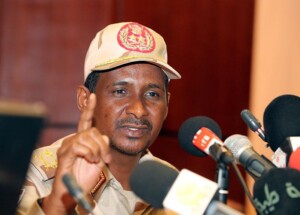Sudanese Journalists Syndicate elects first chair in 33 years
The Sudanese Journalists Syndicate elections launched in Khartoum on Saturday morning were successfully concluded. The election committee announced that Abdelmonim Abu Idris, who works for Agence France-Presse (AFP), was democratically chosen as the Syndicate’s new chair.
 Candidate Durra Gambo casts her ballot in in the election of the fist chair of the Sudanese Journalists Syndicate in 33 years (Photo: Social media)
Candidate Durra Gambo casts her ballot in in the election of the fist chair of the Sudanese Journalists Syndicate in 33 years (Photo: Social media)
The Sudanese Journalists Syndicate elections launched in Khartoum on Saturday morning were successfully concluded. The election committee announced that Abdelmonim Abu Idris, who works for Agence France-Presse (AFP), was democratically chosen as the Syndicate’s new chair.
The voting began at 9:00 and continued until 18:00, amid tight security measures by the police. The head of the Elections Committee, Feisal Mohamed Salih, announced in a press statement following the ballot count that Abu Idris obtained 205 of a total of 659 votes, including 63 electronic votes and 596 paper ones, while the spoiled votes were 64.
The candidate of the Sudanese Journalists’ Network, Ayman Sangarab, received 158 votes, candidate of the Professional Press Alliance Maisara Eisa Salem received 101 votes, while independent candidate Durra Gambo received 86 votes.
The election committee allowed journalists in the states and outside Sudan to vote electronically, in a precedent, the first of its kind in Sudan, in the elections in which seven candidates ran for the position of chair.
Elections committee
Feisal Mohamed Salih told the press in Khartoum on Friday that the number of participants entitled to vote is 1,100 journalists inside Sudan, and 150 outside it, stressing that the number is 90 per cent of the actual working journalists.
“This is the greatest democratic exercise in more than thirty years in the history of unions, and we have been challenged by many obstacles,” he said.
The union is a voluntary organisation represented by a general assembly and is based on international laws such as the International Labor Organization Convention ratified by Sudan and entered into force in 2021.
The General Registrar of the Sudanese Labour Organisations earlier called the establishment of the new Journalists Syndicate “illegal” on the grounds that a trade union can only be established on the basis of the Sudanese Trade Unions Law of 2010.
The Unified Physicians’ Office denounced the decision of the General Registrar of Work Organizations of the illegality of establishing the Syndicate of Journalists.
The office said in a statement on Friday that the decision of the General Registrar contradicts the international conventions ratified by Sudan which support freedom of work and union organization in March 2021.
The physicians noted that 2010 Trade Unions Law “is part of a system of laws restricting freedoms that the revolution took place to overturn, and represents a serious threat to the freedoms that the Sudanese people have obtained.
“We also call for a strict resistance to all practices that target the freedom of professional and trade union organisations,” the statement said.
The Sudanese Teachers Committee expressed its gratitude for the steps taken by the journalists by forming a union body for them. And announced its full support for the step.
The teachers said in a statement on Friday that the step taken by the journalists is based on the foundations and standards of unions set by the International Labor Organization (ILO), and comes after the ratification by Sudan last year. It came into force, after it was ratified by the transitional government last year.
“Therefore, there is no room for the broken talk that supporters of the former regime say about the illegality of these elections, noting that general assemblies have the inherent right and that we will continue to support this step.”
Sudan trade unions
Trade unions in Sudan, officially established in 1947, have always been well-organised. They were instrumental in the October 1964 Revolution which overthrew Ibrahim Abboud’s dictatorship, and the popular uprising against President Jaafar El Nimeiri in March 1985 when the people chose their leadership represented by the Union Association. For this reason, the regime of Omar Al Bashir dissolved the trade unions and other professional associations a year after it took power in a military coup in June 1989, and established new unions with members affiliated with the new regime.
When the Al Bashir regime was overthrown in April 2019 after a popular revolution, the civilian government of PM Abdallah Hamdok, which shared power with the military, dismantled the unions affiliated with the ousted Al Bashir regime as part of legal reforms to dismantle the former dictatorial system.
However, now that the military is in full power again after the coup d’état of October 25 against Hamdok, the authorities are planning to reinstate many of these Al Bashir-affiliated unions. They did something similar after taking power in the 2019 coup. The Sudanese Professionals Association (SPA) said at the time that it rejects the “unions of the establishment”, explaining that “these unions do the opposite of real union work”.
Earlier this month, 27 workers’ groups staged a vigil in front of the ILO office in Khartoum in protest against plans of the military government to restore the legitimacy of trade unions set up by the ousted regime of Al Bashir.











 and then
and then